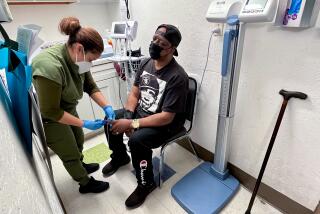SCIENCE / MEDICINE : Public Cholesterol Tests Under Scrutiny
- Share via
Ever since the government began urging all Americans over age 20 to get their blood cholesterol levels tested, technicians with portable analyzers have been showing up at health fairs, shopping malls and grocery stores.
But two recent studies suggest such tests often are inaccurate, either because of problems with the analyzers themselves or because the people who operate the devices are inadequately trained.
Researchers in Massachusetts and Minnesota discovered that the screening results showed people’s cholesterol levels to be higher or lower than they actually were as much as 25% of the time.
The first study, co-authored by Dr. Harvey W. Kaufman of the Boston University School of Medicine, casts serious doubt on the accuracy of most public cholesterol tests.
Blood was drawn from 96 people who were referred to a research center at Tufts University in Medford, Mass., and each blood sample was tested by five of the most popular portable cholesterol analyzers. The results were compared to measurements made by a laboratory system that had a high degree of accuracy.
Kaufman said the research showed only two of the machines produced readings accurate enough to meet federal guidelines; three analyzers failed to make the grade.
In the second study, researchers from the University of Minnesota looked at the precision of tests carried out at four public settings, including a state fair, two stores and a workplace.
Like the Massachusetts researchers, they compared the results from portable analyzers to highly accurate laboratory tests. What they found was a correlation between the degree of an operator’s training and the accuracy of the results.






